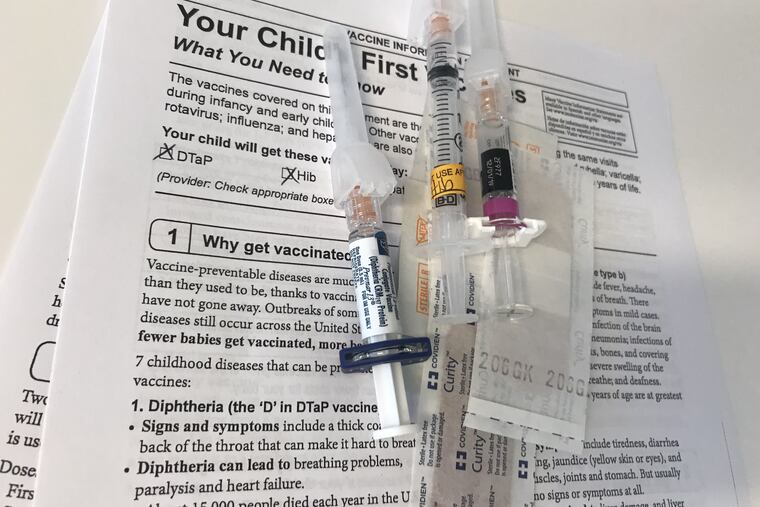Anti-vaxxers are a problem for herd immunity, but lack of paid family leave might be a bigger one | Brain Trust
New research suggests that requiring paid family leave might improve vaccinations outcomes.

The Issue: All over the United States there are outbreaks of diseases that had been all but eradicated in the past thanks to vaccination. The cause of these outbreaks often falls on parents who are a part of the so-called anti-vaxxer movement — an anti-science trend that started with a retracted and debunked study that alleged to show that vaccines cause autism. But anti-vaxxers are not the only barrier to what researchers call herd immunity — resistance to a disease that is achieved through a high rate of vaccination in a population. Some poorer parents don’t vaccinate their child — at all or on time — and not because of anti-vaxxers’ ideology.
Agnitra Roy Choudhury, a visiting assistant professor of economics at Auburn University in Alabama, studies the impact of labor policies on children’s health. In a recent study, he and his colleague Solomon Polachek looked at the impact of California’s paid family leave policy on the rate of infants being vaccinated on time.
The bottom line: “The probability of being late on these vaccinations [which infants get in the first few months of life] falls for children who are born in California after the policy [paid family leave] was implemented, relative to children who are born in states that don’t have access to this policy,” Dr. Choudhury explains. Further, “the impact of this policy is much bigger for poor families.”
Taking a step back. There is no federal paid family leave. In 1993, Congress passed the Family Leave Medical Act, which allows new parents to take up to 12 weeks of unpaid leave. For a lot of families, “the fact that it is unpaid means that they are not going to take the time off, because they can’t.” In 2004, California became the first state in the nation to assure paid family leave — up to six weeks in a year, continuously or intermittently, with 55% wage replacement. Choudhury found that most parents used their six weeks in the first six months after birth.
Since 2004, seven other states enacted paid family leave. That’s critical considering that voluntary corporate paid leave policies cover only 16% of the private labor force.
» READ MORE: New Jersey vaccine exemptions for schoolkids rose by more than half in five years
Looking at data that show some parents don’t meet the CDC’s recommended vaccination schedule, Choudhury wondered if the issue was time. “It might be that parents initially would delay vaccinating their kids if they face significant time constraints, and access to paid family leave would relax these time constraints.” That is a major problem because delaying vaccines is risky for the health of the child — and could make it harder to catch up later.
How did the researchers study this question? Knowing that most parents in California used all of their paid family leave in the first six months, Choudhury and his colleague looked at what happened to the rate of on-time vaccination for vaccines given between the release of a newborn from the hospital and six months of life, before and after California implemented the paid family leave policy. They also compared that trend to other states.
The researchers found that California’s paid family leave has led to a decrease in the likelihood that infants in California get their vaccines late. The impact was largest on poorer families.
Why does this matter to Philly? For most vaccines, Philadelphia is doing better than both Pennsylvania and the United States. Overall, according to the Department of Public Health, 78% of children in Philadelphia received their recommended vaccines. Still, the 22% that don’t are a problem. Not all of these kids have anti-vaxxer parents — who tend to be white, college-educated, and affluent. What’s more likely is that these parents have problems with access to primary-care providers or time to take their child.
» READ MORE: Stop telling anti-vaxxers they’re insane for questioning vaccines | Opinion
National surveys of vaccination show that children below the poverty line are significantly less likely to be up on their vaccines. A map of vaccination rates in Philadelphia shows wide disparity between neighborhoods that aligns well, though not perfectly, with disparities in household income.
Philadelphia doesn’t have paid family leave, but it does have paid sick leave and fair workweek protections, and City Council is debating a domestic workers bill of rights. This research suggests these policies are labor protections and public health interventions.
The takeaway: Efforts to improve public health and promote positive health behaviors among the poor often focus on education campaigns, assuming that the problem is knowledge or awareness. By demonstrating that even a short and only partially paid parental leave dropped the rate of late vaccinations, the study tells a bigger story: Often people don’t engage in positive health behaviors not because they don’t know they should but because they don’t have the resources to do it.
Brain Trust is a biweekly column that looks at how new research affects Philly. Ideas? Suggestions? Email Abraham Gutman at agutman@inquirer.com.